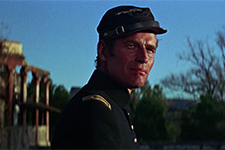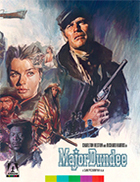Major Dundee
|  In later years, after the dust of its tortured production and his bitter battles with the studio that hired him had settled, Sam Peckinpah would regularly bemoan the fate of Major Dundee, his epic Western about a disgraced Union officer cobbling together a rogue army to track down a marauding Apache warrior in the waning years of the Civil War. In one interview he said that Dundee was “one of the most painful things that had ever happened in my life.” In another, he declared that “Dundee was a fine film, possibly the best picture I’ve made in my life.” The film to which Peckinpah was referring in these interviews, of course, is not what Columbia Pictures released theatrically in the spring of 1965 to generally negative reviews and virtually no box office. Rather, he was referring to a version of the film that existed only in his mind—the true, unrestrained and fully realized rendition of his grand ambition to make an epic anti-Western about the toll of violence and obsession on both the obsessed and those he draws into his orbit. Peckinpah would go on to make a truly great film about similar themes four years later in The Wild Bunch (1969), and Dundee would forever remain a mutilated mongrel, compromised not only by studio interference and a last-minute slashed budget, but by Peckinaph’s failure to secure a completed script before production began and his own tendencies toward self-sabotage and unnecessary conflict for its own contentious sake. Major Dundee began as a treatment by Harry Julian Fink, who had written dozens of episodes of television series such as Have Gun Will Travel and The Eleventh Hour since the late 1950s and would go on to write Don Siegel’s Dirty Harry (1971). Fink’s treatment came into the hands of producer Jerry Bresler, who had recently produced several Gidget comedies and the Hawaiian-set drama Diamond Head (1962), the latter of which starred Charlton Heston, to whom Bresler gave the Dundee script. Once Heston was on board, they went searching for a director. When their first choice, the legendary John Ford, was unavailable due to his being committed to working on Cheyenne Autumn (1965), they turned to Peckinpah, who had recently graduated from the ranks of television work with a pair of Westerns, The Deadly Companions (1961) and Ride the High Country (1962), the latter of which had received rave reviews and immediately catapulted him to the forefront of international filmmakers. Peckinpah immediately set to work on the script, first supervising a draft by Fink (which he loathed so much that he told Fink he was “appalled” by it) and then later working on it himself along with Oscar Saul, who had adapted Tennessee Williams’s A Streetcar Named Desire (1954). Peckinpah’s vision was the antithesis of John Ford’s cavalry Westerns; rather than focusing on soldiers coming together under duress, he wanted to dramatize their coming apart. At the center of his story is a portrait of an obsessed cavalry officer, Major Amos Charles Dundee (Charlton Heston), who is seeking glory and revenge regardless of the cost to himself and those he commands (Peckinpah had been wanting to make a film about George Custer and Little Big Horn, and it seems that he found in Dundee a similarly deluded and incongruously celebrated antihero). Dundee has been banished to a remote outpost in New Mexico, where he oversees Confederate prisoners, including Captain Benjamin Tyreen (Richard Harris), his former friend and fellow West Point graduate. The tension between Dundee and Tyreen is, in many ways, the core of the story, or at least the most demonstrable manifestation of its theme of lethal intractability. The former friends spend the entirety of the film at each other’s throats, as do most of the other characters, thus forming a distinct portrait of how men who speak the language of violence at some point become incapable of speaking anything else. Dundee, operating entirely on his own, is determined to hunt down and kill Sierra Charriba, an Apache war chief who has massacred an entire outpost of men, women, and children (the film opens with their bloody corpses strewn in front of a burning building, a foreshadowing of the more graphic opening massacre in The Wild Bunch). To do this, Dundee assembles his own army comprised of Union soldiers under his command (including Jim Hutton’s comically inept Lieutenant Graham); various Indian scouts, including James Coburn’s one-armed Samuel Potts; a rag-tag collective of local horse thieves and gunslingers (these include characters played by Slim Pickens and Peckinpah regular R.G. Armstrong); and imprisoned Confederate soldiers under Tyreen’s command. This establishes a fascinating paradox, as Dundee marches into battle with men who would otherwise be fighting each other and are therefore always just one word away from doing just that (the Confederate soldiers are particularly rankled by the inclusion of several black Union soldiers led by Brock Peters’s Aesop). Dundee’s mission is fundamentally absurd, as it requires marching into the sun-scorched Mexican desert and into the middle of a revolutionary war between the Mexicans and an occupying French force. The bones of Major Dundee are solid, and there are parts of it that are very nearly brilliant, thus lending support to Peckinpah’s brash claim that it could have been his masterpiece if it hadn’t been taken away from him by Bresler and the studio. Of course, some of the film’s problems predate any studio interference, starting with the script, which has a fantastic opening, a flaccid middle, and a cobbled together third act that struggles to maintain momentum. Peckinpah’s insistence on shooting in far-flung locations all throughout Mexico proved disastrous for the film’s budget and schedule, but resulted in some truly gorgeous shots that allow the harsh terrain to reinforce the madness of Dundee’s quest. Peckinpah’s attention to detail gives the film a gritty quality that is essential to its portrait of heroism going off the rails, but he also flounders in various parts, particularly when Dundee’s army settles into a Mexican village and we get sidetracked by a meandering and not terribly convincing romantic subplot involving a widow named Teresa Santiago (Senta Berger) who becomes a contested romantic object for both Dundee and Tyreen. Much better are the scenes that depict the tensions among Dundee’s soldiers, especially a scene in which Dundee captures a Confederate deserter (Warren Oates) and prepares to execute him in front of the entire company, which is depicted in quick cuts that bring the tension to the point of being nearly unbearable. The battle scenes are appropriately epic and graphic in their violence, although the slow-motion blood squibs and death thralls that give The Wild Bunch and other subsequent Peckinpah films their graphic sense of mortality, are not in evidence here. Peckinpah had wanted to include slow motion in the battle sequences and had shot thousands of feet of it, but he couldn’t figure out how to incorporate it, and the studio-hired editors eventually left it all on the cutting room floor. As Peckinpah said later, “They cut 80 percent of the violence out and made it very attractive and exciting. But the real, bloody, awful things that happen to men in war were cut out of the picture, which I thought was unforgiveable.” The cutting room floor was eventually littered with much of Peckinpah’s footage, as his original 161-minute cut was reduced by Bresler to 135 minutes and then down to 114 minutes by the studio. Peckinpah was locked out of the process, and the film was completed without any of his input. The version that eventually premiered at the Egyptian Theatre in Los Angeles in February 1965 was a dim shadow of Peckinaph’s intentions, saddled with massive plot holes and missing character motivation that was collateral damage from the heavy editing to bring the running time down; a wildly inappropriate musical score; and an insufferable title song that contradicts everything the film is about. Bresler’s 135-minute cut was restored in 2005 with a new and much better score by Christopher Caliendo and christened “The Extended Edition.” It is still a towering mess of brilliance and incoherence, and while it brings the film closer to Peckinpah’s vision, one has to wonder what a properly finished version of his 161-minute rough cut could have been. Or, for that matter, what if Peckinpah had been given his entire budget, production schedule, and more time to complete the script? Like so many cinematic mysteries, this one will never be solved, leaving us with the tantalizing possibilities of what could have been.
Copyright © 2021 James Kendrick Thoughts? E-mail James Kendrick All images copyright © Arrow Video | |||||||||||||||||||||||||||||
Overall Rating: 

 (3)
(3)


